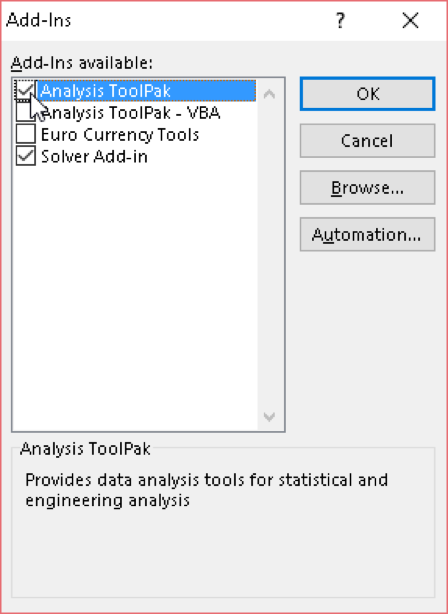

Custom functionsĬustom functions enable developers to add new functions to Excel by defining those functions in JavaScript as part of an add-in. For a sample that implements a task pane in Excel, see Excel Add-in JS WoodGrove Expense Trends.
#WHERE IS ADD INS ON EXCEL MAC CODE#
Task panes give users access to interface controls that run code to modify the Excel document or display data from a data source.įor more information about task panes, see Task panes in Office Add-ins. Task panes are interface surfaces that typically appear on the right side of the window within Excel. When users select an add-in command, they initiate actions such as running JavaScript code, or showing a page of the add-in in a task pane.įor more information about command capabilities, supported platforms, and best practices for developing add-in commands, see Add-in commands for Excel, Word, and PowerPoint. You can use add-in commands to add a button on the ribbon or an item to a context menu in Excel. Add-in commandsĪdd-in commands are UI elements that extend the Excel UI and start actions in your add-in. In addition to interacting with the content in the workbook, Excel add-ins can add custom ribbon buttons or menu commands, insert task panes, add custom functions, open dialog boxes, and even embed rich, web-based objects such as charts or interactive visualizations within a worksheet. For details about publishing to AppSource, see Make your solutions available in AppSource and within Office.
#WHERE IS ADD INS ON EXCEL MAC INSTALL#
To enable end users to install and use an Excel add-in, you must publish its manifest either to AppSource or to an add-ins catalog. Permissions that the add-in requires, such as reading and writing to the document.How the add-in integrates with Excel, including any custom UI that the add-in creates (ribbon buttons, context menus, and so on).The add-in's display name, description, ID, version, and default locale.The URL of the add-in's web application.The manifest is an XML configuration file that defines how the add-in integrates with Office clients by specifying settings and capabilities such as: The web application can be hosted on any web server, and can be built using client-side frameworks (such as Angular, React, jQuery) or server-side technologies (such as ASP.NET, Node.js, PHP). Issue API requests to Microsoft Graph or any other API.Perform user authorization with an online service by using the standard OAuth 2.0 flow.Create, read, update, and delete data in the workbook (worksheets, ranges, tables, charts, named items, and more).For example, an add-in can perform any of the following tasks. The web application uses the Office JavaScript API to interact with objects in Excel, and can also facilitate interaction with online resources. Components of an Excel add-inĪn Excel add-in includes two basic components: a web application and a configuration file, called a manifest file. Unlike COM add-ins, Excel add-ins do not require you to install any code on a user's device, or within Excel. Distribution via AppSource: Share your Excel add-in with a broad audience by publishing it to AppSource.Įxcel add-ins are different from COM and VSTO add-ins, which are earlier Office integration solutions that run only in Office on Windows.Use of standard web technology: Create your Excel add-in using familiar web technologies such as HTML, CSS, and JavaScript.Centralized deployment: Admins can quickly and easily deploy Excel add-ins to users throughout an organization.Cross-platform support: Excel add-ins run in Office on the web, Windows, Mac, and iPad.By using the Office Add-ins platform to create your Excel add-in, you'll get the following benefits. The Office Add-ins platform provides the framework and Office.js JavaScript APIs that enable you to create and run Excel add-ins. Provide richer interaction using dialog window.Add custom ribbon buttons or contextual menu items.Extend functionality using web based task pane or content pane.Interact with Excel objects, read and write Excel data.

An Excel add-in allows you to extend Excel application functionality across multiple platforms including Windows, Mac, iPad, and in a browser.


 0 kommentar(er)
0 kommentar(er)
